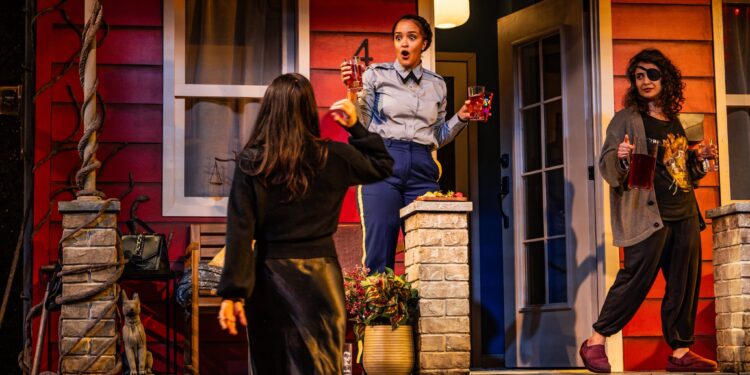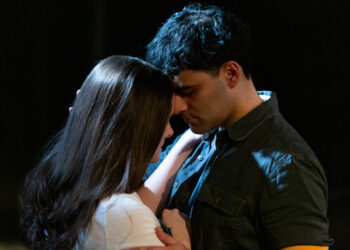Branden Jacobs-Jenkins’s scorcher of a script about passing time is skillfully handled by a strong cast. They grasp the power of words and their conveyed impact.
Set immediately after the global Covid-19 pandemic, a group of old classmates—who call themselves the ‘Multi-Ethnic Reject Group’ or MERG (soft g sound)—reunite at Ursula’s (Ghazal Azarbad) proud American-style porch residence. She has lived there with her grandmother. After her grandmother’s passing, Ursula took over ownership and has maintained the house. Much like in films such as The Big Chill or St. Elmo’s Fire, MERG members gather first at Ursula’s for their 20th high school reunion before heading to the school itself. What starts as a warm reunion full of hugs gradually reveals darker undertones. The group drinks, and as they indulge in alcohol like a bacchanal celebration, old wounds resurface from twenty years ago. This diverse group of individuals confronts the choices that have shaped who they are today and reflects on friendships that have either endured or fallen apart.
What’s alarming (read frightening once you’ve seen the play) is the inherent sense that there’s something this group cannot escape, nor any of us who have ever returned for reunions.
Solid artistic choices evoke a looming sense of doom beneath this seemingly celebratory reunion. During the pre-show, Olivia Wheeler incorporates a subtle, rhythmic, pulsating, and pounding musical beat that continues right up to the moment the production begins. Eerily lit by Jason Hand’s design, Shannon Lea Doyle’s very American Southern-looking historical front porch aptly reflects the eccentricities and character of the previous and current owners. Ming Wong’s costume designs look terrific on the five actors. The clothing helps to delineate the ‘status’ each of them brings to this reunion.
Frank Cox-O’Connell’s sharp direction skillfully builds suspense in how he portrays the characters and their backstories. He carefully explores whether these individuals have moved on with their lives or are still as they once were. The production’s intense pacing mostly remains consistent as character development unfolds. However, it begins to slow down during the final conversation between Mazin Elsadig’s Emilio and Azarbad’s Ursula as they sit on the porch.
The reason for that?
For nearly an hour and forty-five minutes, the audience hasn’t had a chance to breathe. As an audience member that night, I sat on the edge of my seat, moving my head back and forth as if I were watching a tennis match and wondering what might appear on stage next. I was exhausted by the end of the play – exhilarated but tired.
The five-person ensemble cast remains strong. They understand the power of words and their impact on others. The play’s characters may seem to have it all together when we first meet them; however, as the pre-celebratory drinks continue, the audience begins to see how much they have become misfits. The characters teeter on the edge of destruction as the truth of their lives is revealed.
Ghazal Azarbad’s eccentric Ursula becomes more appealing. She doesn’t want to attend the reunion this time, even though she has in the past. Why is that? What has happened to make Ursula hesitant to go? Azarbad creates an intriguing mystery around her feelings for Mazin Elsadig’s Emilio, a new father, who has lived in Europe for a long time. He’s a photographer, and the last time he took pictures was at their friend Kristina’s wedding. However, at the top of the show, Elsadig breaks the fourth wall by speaking directly to the audience. He says something that surely heightens the suspense.
The arrival of classmate Caitlin (Nicole Power) adds further intrigue. Caitlin is a stylish dresser who seems to have it all together. She’s married with stepchildren. Nicole Power subtly reveals that her Caitlin isn’t as happy as she appears. The final arrival is Kristina (Bahia Watson), a devout Catholic and mother of five children. Years ago, Kristina and Emilio were together. She brings her cousin Francisco (Carlos Gonzales-Vio), also known as Paco, who was not a member of MERG, which unnerves Emilio. Kristina didn’t want to exclude her cousin. Caitlin and Francisco were involved twenty years ago, and it also becomes clear that the spark has not been fully extinguished.
Bahia Watson’s Kristina is feisty. This reunion provides a moment when she can forget the responsibilities of her professional life as a doctor and just let loose. At one point, Watson delivers an acting class gold star monologue about how she truly feels regarding her roles as a doctor, wife, and mother. The monologue is terrific. Gonzales-Vio’s Paco is brooding and mysterious when he first enters the party scene. He watches and listens intently. Gonzales-Vio’s physical presence commands attention in those initial moments. When the truth comes out that he suffers from PTSD as a result of his work as a soldier, Gonzales-Vio becomes mesmerizing in his on-stage work. The fiery passion between him and Powers’ Caitlin is genuine and palpable.
In his Director’s Note, Cox-O’Connell explains how the understanding of time in the play is fascinating.
I couldn’t agree more with him. Having been involved in organizing my high school’s 50th anniversary over twenty years ago, I immediately connected with what Cox-O’Connell says about the passing of time. It’s a unifier and a siren song of nostalgia. Having attended the 25th and 50th anniversaries of my high school, I understand what Cox-O’Connell also mentions about time: we’re all really being chased down by the great, humble reality – we all grow old.
The Comeuppance is good theatre. There’s no intermission, so please be aware of that before the performance begins. After viewing the production, there’s no logical place for a pause, as it would undermine the story’s substantial dramatic impact.
Please get to see it before it closes.
Running time: approximately two hours and 10 minutes with no interval/intermission.
The production runs to November 23 at the Young Centre for the Performing Arts, 50 Tank House Lane, in Toronto’s Distillery District. For tickets: soulpepper.ca or call (416) 866-8666 or boxoffice@soulpepper.ca
SOULPEPPER THEATRE presents
The Comeuppance by Branden Jacobs-Jenkins
Directed by Frank Cox-O’Connell
Set Designer: Shannon Lea Doyle
Costume Designer: Ming Wong 黄慧明
Lighting Designer: Jason Hand
Sound Designer: Olivia Wheeler
Stage Manager: Nazerah Carlisle
Performers: Ghazal Azarbad, Mazin Elsadig, Carlos Gonzales-Vio, Nicole Power, Bahia Watson, Araya Mengesha (Voice and Likeness)
















